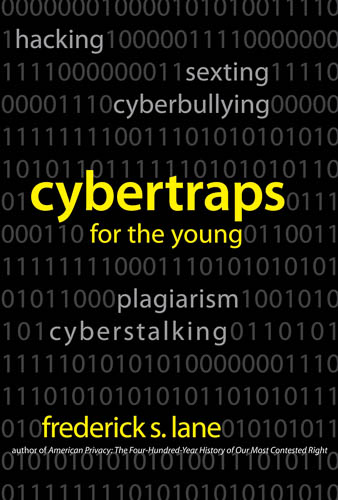Author, privacy expert and computer forensics expert Frederick Lane sat down with me recently to discuss his book, “Cyber Traps for the Young”. Lane has published three Cybertrap books thus far. Lane shares the risks associated with youth having tools given to them by their parents that may put their children at risk of committing crimes. Lane shares his insights from the book and expresses concerns that applications and games on phones are being used to harvest information about kids. Lane provides recommendations to parents on trying to delay the use of electronic communications devices as long as possible. Society presses kids to get online, but that may not be the best for children.
Month: September 2019
Robocall Legislative Update
Are robocalls driving you nuts?
Cyber Security & Computer Forensics Expert Lee Neubecker and Data Privacy Expert Debbie Reynolds discuss recent efforts to pass legislation in the House and Senate that would hold telecommunication providers responsible for addressing the ever growing tide of robocalls disrupting consumers and businesses. Existing laws such as the Telephone Consumer Protection Act (TCPA) have proven effective in blocking off shore robocalls. VOIP technology allows for robocall centers to systematically dial U.S. consumers and businesses from beyond the legal reach of our court system. Popular spoofing techniques such as Neighborhood Calling often impersonate the first 6 digits of the call receiver’s phone number in the hope of enticing that call receiver to answer a call. Neubecker and Reynolds both share their frustrations with the current situation and are hopeful the U.S. Senate and the President will take immediate action to pass updated privacy legislation protecting us all from spam robocalls.
The transcript of the video follows:
Lee Neubecker: I’m here today with Debbie Reynolds. We’re going to be talking a little bit about robocall and some new legislation coming our way. Those annoying phone calls we all get on our cellphones.
Debbie Reynolds: That’s right.
Lee Neubecker: Have you gotten any calls where it’s the first six digits of your phone number?
Debbie Reynolds: Yes!
Lee Neubecker: That’s called “neighborhood calling”. And basically, what the bad guys are doing is that they’re using VOIP technology to spoof, and they’re plugging in any number. So they can actually impersonate people you know. But they do this because they think that it increases the likelihood that you’ll answer the phone. In fact, for me, when I see those first six digits, I’m not even going to answer it.
Debbie Reynolds: Oh, absolutely. Absolutely. It’s wrong or what now?
Lee Neubecker: One of the big problems we have is no one’s taking accountability for this. I heard AT&T is trying to force some authentication mechanisms, but there needs to be some more teeth on this so that people can’t just impersonate phone numbers, or we’ll never get through this.
Debbie Reynolds: Absolutely, absolutely. Actually, so, thankfully this law passed, right?
Lee Neubecker: Well, it’s going through. It passed under the House, overwhelmingly
Debbie Reynolds: Overwhelming, yeah.
Lee Neubecker: They’re hoping that… It said it could happen by 2020, perhaps?
Debbie Reynolds: Okay, that’d be good.
Lee Neubecker: But it’s got to… I think they have to reconcile the two bills, the House and senate, and then the President has to sign it. But by the show of votes, I think everyone’s in favor of let’s tackle all these annoying robocalls.
Debbie Reynolds: Absolutely. So the FCC, they really made a lot of headway many years ago on the Do Not Call Registry, so this will be sort of another layer to that, that the FCC is sort of looking at. I don’t know about you, but I’m very annoyed when I get robocalls, so I’m not happy about this. Maybe it will happen after the election, because the election, people like to be robocalled.
Lee Neubecker: I get tons of calls from people wanting to lend me money, They will ring my phone once and then it will hit my voicemail. This woman keeps calling, saying, I want to speak to you. It’s like, and it’s not even a real person, It’s all automated. It’s annoying.
Debbie Reynolds: Oh, my goodness. Well, one interesting thing about the law, or the one that they’re anticipating, or trying to pass, that I haven’t seen in other laws like this, they’re trying to force companies to create technology, to be able to tell a robocall.
Lee Neubecker: The carriers need to enforce it. The carriers have to stop allowing unsecured VOIP to impersonate calls.
Debbie Reynolds: Right. The House does not allow it, but they specifically said they have to create, if it does exist, they have to create some technology to make sure they can tell a robocall from a normal call?
Lee Neubecker: It’s basically like, we’re going to block any call that isn’t using a means of identity verification. Right now, it’s about a bust.
Debbie Reynolds: And they can’t charge for it, so it’s not like an extra fee. I’m sure what’ll happen is they’ll do you another fee and then call it something else, but it’ll be probably just robocalls.
Lee Neubecker: The act also increased the penalty. Current legislation, the TCPA, the Telephone Consumer Protection Act, dealt with spam faxes, calls, and what-not, but the robocall act is going to produce penalties I think to ten thousand dollars each.
Debbie Reynolds: Per incident.
Lee Neubecker: Per incident.
Debbie Reynolds: So that’s a lot.
Lee Neubecker: So that’s going to drive my TCPA consulting business, because that’s work.
Debbie Reynolds: Yeah, absolutely. Well, if it actually makes it, I’m sure the thing about the $10,000 per incident and also, forcing companies to create technology to be able to tell what’s a robocall, corporations or the carriers are probably going to fight that. So, we’ll see.
Lee Neubecker: Yeah. So Debbie, what are the likely impacts on the litigation environment, as you see it? If this legislation goes through?
Debbie Reynolds: Well, first of all, there will be companies that will, uh, I’m sure there will be consumer groups that want to bundle together consumer complaints and probably go after these carriers to try to get these big fines or whatever. So, this could be tying up the legislation for a while. Once the lawyers get their fees, You’ll probably want to get the $10,000 per incident.
Lee Neubecker: It’s going to make it a lot more, in my opinion, they will make it much easier to actually identify who’s behind it, because right now people are using proxy phone numbers to call and many of them are just total scams run out of the country. You can’t– A Nigerian spam call center, we can’t really go after, but if our carriers say they’re going to block these rogue, foreign VOIP connections, then it will make it more secure. Ultimately, you’ll probably have people who opt in to the insecure network, and people who want a secure-only platform where it’s no use calling them.
Debbie Reynolds: I agree.
Lee Neubecker: Thank you for being on the show today. It was great to have you on again. I love your scarf.
Debbie Reynolds: Thank you.
Lee Neubecker: You always have interesting scarves.
Debbie Reynolds: Thank you. A pleasure.
Lee Neubecker: We’ll see you soon.
Debbie Reynolds: Okay, bye bye.
Debbie Reynolds Contact Info
datadiva at debbiereynoldsconsulting dot com
312-513-3665
https://www.linkedin.com/in/debbieareynolds/
https://debbiereynoldsconsulting.com/
Computer Forensics in Medical Malpractice
Importance of Computer Forensics in Medical Malpractice Litigation by revealing patient electronic medical records.
Computer Forensics Wins Litigation
Enigma Forensics CEO & President Lee Neubecker interviews James Meyer a personal injury attorney from Ialongo and Meyer. Computer Forensics uncovers answers to important questions such as; what orders may or may not have been entered as a result of that medical test. In this video, Lee and Jim share some of the changes that have ocurred that impact medical malpractice litigation. Tune in to find out how using computer forensics can make or break a case.
The transcript of the video interview follows:
Lee Neubecker: Hi this is Lee Neubecker, I’m here with Jim Meyer from Ialongo and Meyer, and we’re here today talking about patient medical records, specifically electronic medical records. Some of the changes that have happened that impact medical malpractice litigation. So Jim, can you tell me a little bit about EMR and how computer forensics plays a role in cases that you’re litigating, where you’re trying to get a result for your client?
Jim Meyer: Well EMR has changed everything, in regards to medical records. HIPAA is required that the electronic medical records, both be secure and private, that requirement provides that a lot of metadata is collected with every electronic medical record. That metadata itself is very important in… Capturing information about where, when, how and whom, made the medical record, can be crucial in any medical investigation.
Lee Neubecker: Look, can you tell me an example of what type of metadata you might be asking for, and why it would be relevant to the outcome of litigation?
Jim Meyer: Well… The metadata that is most interesting in most cases is, when certain events occurred in a medical record. When a test was ordered, when it was performed, when the results were placed in the patient’s medical record, when the physician saw those results, what orders may or may not have been entered as a result of that medical test. When medication is prescribed, when it’s administered, who administered the medication. Many of these details are now electronically captured, as opposed to being physically noted, as they were in old written medical records. It can make a… Big difference in trying to determine when events occurred in a case.
Lee Neubecker: I know one of the cases I was involved in, I discovered that many of the different default reports that are provided with these medical software packages, don’t necessarily show all available metadata. In fact, what we had to do on one of the cases, we had to work through discovery to try to get the scheme of the database. And then we discovered in once instance that there was something known as a sticky note, that the nurses and physicians could type little comments in, but there was a presumption that would never get printed because it’s not in any of the default reports. So what we actually had to do is find the table that had these notes, and then work to get the data dumped. And as soon as we found that, the case quickly settled, because obviously, the hospitals don’t want everyone knowing what’s going on.
Jim Meyer: That’s a disadvantage that a plaintiff in a case may have. Hospitals often times have entire departments in medical informatics, departments in which they have experts that know the in’s and out’s of the EMR, the metadata collected, often times plaintiffs do not, but they should be aware of the fact that that metadata exists. Extracting it from the record is often times… It is a need for an expert at computer forensics, expert, an IT expert. But it’s important that plaintiffs, and all attorneys, defense attorneys and plaintiffs attorneys realize that that information exists as metadata in these records, it can be obtained. We take great deal of effort to obtain it, but it’s there.
Lee Neubecker: And Jim and I co-authored a paper along with another attorney that appeared in the Illinois State Bar Association on EMR patient medical records, the audit trail and other things impacting HIPPAA and medical malpractice regulations. We’ll put that up here too so that you check that out. Anything else you’d like to add about your practice, Jim?
Jim Meyer: No, we’re happy practicing attorneys in Chicago, Illinois. I would recommend any attorney who is involved in any issue similar to this, to take a look at the article that Lee was kind enough to co-author with me and John Tomes, it really is a lot of information. Detailed information that attorney’s should know.
Lee Neubecker: Great, thank you.
Jim Meyer: You’re welcome.



